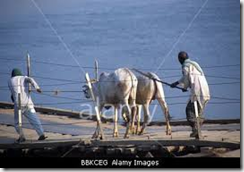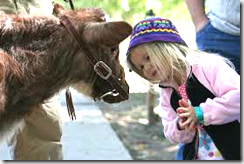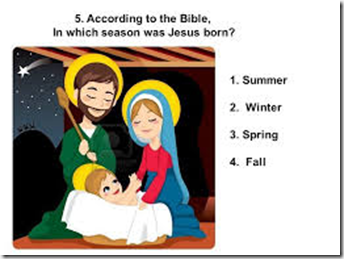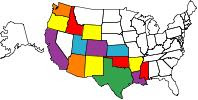For "Scripture Sunday":
The Tender Mercies of the Wicked?
Proverbs 12:10 "A righteous man regards the life of his animal, but the tender mercies of the wicked are cruel."
 " King Solomon recognized that a righteous person will not only treat his fellow man kindly, but will also care for his animals.
" King Solomon recognized that a righteous person will not only treat his fellow man kindly, but will also care for his animals.
 It seems the implication is that the godly person shows more kindness to animals than a wicked person shows to other people—even on a good day. We should treat animals—and people, especially—with compassion, not cruelty.
It seems the implication is that the godly person shows more kindness to animals than a wicked person shows to other people—even on a good day. We should treat animals—and people, especially—with compassion, not cruelty.
For more about practicing kindness, see “Fruit of the Spirit: Kindness.”
_________
The Can Opener
An Amazing Fact: "Did you know it was 48 years after tin cans were first introduced before the can opener was invented? Until then, cans were beaten open with a hammer and chisel. The tin can for preserving food was patented in 1810 by a Londoner, Peter Durand. Only one year before, French confectioner Nicolas Appert had introduced the method of canning food by sealing the heated food tightly inside a glass wine bottle or jar. He could not explain why the food stayed fresh, but his bright idea won him a 12,000-francs prize from Napoleon. Appert helped Napoleon’s army march on its stomach while Durand supplied the Royal Navy with canned food.
But tin canning was not widely adopted until 1846, when a machine was invented that increased can production from six cans an hour to 60. Still, there were no can openers, and the product labels would read: “Cut around on the top with a chisel and hammer.”
 The can opener was finally invented in 1858 by American Ezra Warnet. But the can opener did not become popular for another 10 years until it was given away for free with canned beef.
The can opener was finally invented in 1858 by American Ezra Warnet. But the can opener did not become popular for another 10 years until it was given away for free with canned beef.
 The well-known double wheel-style opener was invented in 1925, and the easy pop-top lid was invented in France in 1959. Since aluminum cans made their first appearance in America in 1953, some 74 million tons of aluminum cans (about 3 trillion cans) have been produced. Placed end to end, they could stretch to the moon and back about 500 times! Still, about one quarter of all cans are recycled, some 9 million cans every hour. That is good news when you consider that it takes about 200 years for a buried aluminum can to degrade.
The well-known double wheel-style opener was invented in 1925, and the easy pop-top lid was invented in France in 1959. Since aluminum cans made their first appearance in America in 1953, some 74 million tons of aluminum cans (about 3 trillion cans) have been produced. Placed end to end, they could stretch to the moon and back about 500 times! Still, about one quarter of all cans are recycled, some 9 million cans every hour. That is good news when you consider that it takes about 200 years for a buried aluminum can to degrade.
Did you know the Bible teaches that no matter how long Christians are buried, when their graves are opened they will come up with new bodies? We are given a sample of what it will be like when we read the story of Lazarus being raised from the dead by Jesus. When Christ stood before the tomb of His dead friend, Jesus asked for the stone blocking the entrance to be rolled away. Notice what happens: “Martha, the sister of him who was dead, said to Him, ‘Lord, by this time there is a stench, for he has been dead four days’” (John 11:39). The Lord does not need a
special gadget to open graves where bodies have turned to dust. At the voice of an archangel and with the trumpet of God, the dead will rise.
KEY BIBLE TEXTS
"For the Lord himself shall descend from heaven with a shout, with the voice of the archangel, and with the trump of God: and the dead in Christ shall rise first" - 1 Thessalonians 4:16
_______
"The Longhorn: Texas Tough"
 "Traveling through the plains in Texas, you’re bound to see the unmistakable silhouette of the famed Texas Longhorn. As our state’s official large mammal, the mascot of our flagship university, and a surviving symbol of the old American West, the Longhorn is ingrained into our way of life as Texans.
"Traveling through the plains in Texas, you’re bound to see the unmistakable silhouette of the famed Texas Longhorn. As our state’s official large mammal, the mascot of our flagship university, and a surviving symbol of the old American West, the Longhorn is ingrained into our way of life as Texans.
This time of year in particular, we’re reminded of their storied history. Ranchers have just finished showcasing their best stock at the annual Texas State Fair’s Longhorn Show, and in the midst of football season, the orange Longhorn silhouettes seem to be everywhere.
But only 100 years ago, Texas Longhorns were nearly extinct.
When the first cattle set hoof in the New World more than 500 years ago, they surprised the Spanish settlers who brought them by overcoming the challenging terrain and thriving. The previously domesticated cattle from Europe became tough enough to survive droughts and floods, sweltering heat and bone-chilling cold, while grazing easily on whatever land they occupied. Amazingly, the first Longhorns were even resistant to diseases found in the New World. They lived longer and reproduced more quickly than other breeds; before long, there were millions of Longhorns roaming free, and feral herds quickly found a home in Texas.
As more European settlers made their way to Texas, Longhorns provided a stable source of meat and income no matter the conditions. A German traveler making his way through Texas in 1848 remarked, “In Texas, cattle live for the sake of man, but in all other countries man lives for the sake of his cattle.”
Longhorns continued to thrive throughout the 19th Century and found themselves increasingly in demand. European investors offered ranchers gold to expand their Longhorn operations, and these ranchers were even exempt from the Confederate draft because of their important role in providing food for soldiers.
But not long after soldiers returned home from the war, Longhorns began to suffer. Once trade relationships were re-established between the former Union and Confederate states, mass disease wiped out herd after herd across New England farms – except the Longhorns. Northern farmers blamed the species and began slaughtering them in masses. Sadly, what they dubbed the ‘Texas Fever’ was actually a disease carried by ticks, not the Longhorns, who were simply immune.
Demand continued to plummet because Longhorn meat did not produce enough tallow, or animal fat, to be utilized in the manufacturing of increasingly popular items like candles and soap. Moreover, Longhorn meat was hard to keep fresh absent prolonged refrigeration, and as a result wasn’t viable as a commercial product in the 19th Century. As a result, by 1910, Texas Longhorns were almost nowhere to be found.
And if it weren’t for Will C. Barnes, a U.S. Army Signal Corps private turned cattle rancher, Longhorns may have continued down the path to complete extinction. After leaving the military, in 1887 Mr. Barnes led a team of U.S. Forest Service trailblazers across the west and managed to round up 27 surviving pure Texas Longhorns. In 1927, he created a protected home in the Wichita Mountains Wildlife Refuge in Oklahoma, effectively saving the breed and enabling them to once again flourish."
From John Cornyn's Texas Times Column.
_______
Update:
One flooring company showed just the linoleum that I wanted on their webpage, but when I went there on Friday to order it, they couldn't find it in their samples. When I was back in front of my computer, I called them and they finally found it. But it is a commercial flooring and I think he quoted me a wrong price. So still looking for lino.
Jay and I also went to some thrift shops, and he found some work shoes and shirts. He keeps on giving his away. He gets tired of things.
On Saturday we both went to church, and I had made a pumpkin-choc-cinnamon pie in a graham cracker crust, it was decadent, especially as I took some Redi-Whip to go on it. There weren't many people there as the weather was bad and some come from quite a way away, like Houston.
The Bible readings were Gen. 18:1-22:24, 2 Kings 4:1-37, and James 2:14-20. The Teaching was about God's Laws. How every time the people disobeyed his laws and lived carnally, they were punished. Like the flood, Sodom and Gomorrah, etc. There are lots of laws in the Bible, including dietary laws, and they are all for our own good.
We had to dash between the raindrops from the chapel to the dining hall. There was a good spread of food including some great corned beef. We had fun and fellowship while eating the potluck, even though we were a small group that day.
























